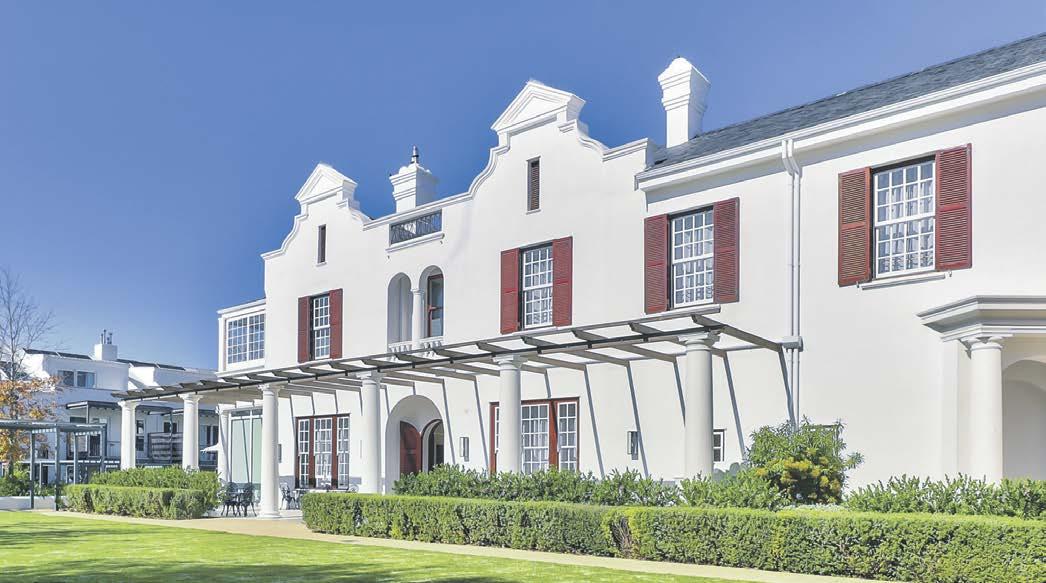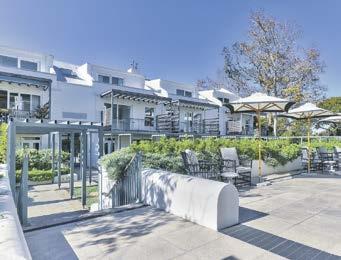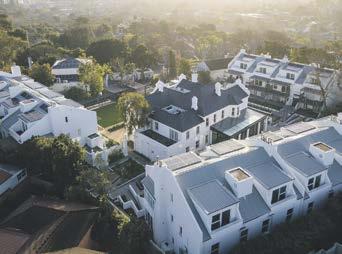




AFTER much consultation, the City of Cape Town is proposing several amendments and new provisions to the Municipal Planning By-law that regulates development and land use in the city as part of its five-year review process.
The deputy mayor and mayoral committee member for Spatial Planning and Environment, Eddie Andrews, says that in addition to the proposed amendments, there are new provisions.
Two of them speak specifically to the micro-developer:
• An “affordable rental flat” is a new proposed additional use right on properties within 194 identified areas across Cape Town to enable the development of smallscale affordable rental accommodation in these areas.
It is proposed that the number of small scale affordable rental units on a single property may not exceed eight units plus a dwelling house, or 12 units if there is no dwelling house on the land. A map of the proposed 194 areas is available online, and residents are encouraged to peruse the map and to submit their comments
• One of the key initiatives for making it easier and more costeffective to develop, is the proposed introduction of incentive overlay zones for development focus areas in Athlone, Maitland, Parow/Elsies River, Bellville and Diep River. The intention is to assign additional and enhanced development rights to properties that fall within these zones.
These and the many other amendments suggested are intended to make it easier to build and develop in Cape Town, improve clarity and certainty, encourage the development of affordable rental accommodation in identified areas, accommodate advancements in the renewable energy sector, and enable the City to impound moveable property that is being used for illegal building and demolition work when an order to stop work is ignored, among others.
Have your say
The City is urging Capetonians to make use of the opportunity to comment on the proposed new provisions and amendments to municipal planning by-law.
The proposed revised Municipal Planning By-law and an explanatory document to guide comments are available on the City’s website at www.capetown. gov.za/haveyoursay.
Comments and recommendations can be submitted as follows:
1. Online, at www.capetown. gov.za/haveyoursay
2. Email to lums@capetown. gov.za
VIVIAN WARBY
TIRED of “empty promises”, and being relegated to the outskirts of the country’s working systems, township property micro-developers this week have said they are tired of fighting for a seat at “the table”. Instead, they called on government, banks and other players to come to their table, on the ground where change is happening, to work out ways to unlock the market.
This follows President Cyril Ramaphosa’s first address since the new government of national unity (GNU) earlier this month, in which he promised to improve infrastructure in the country, saying he would turn it into a construction site. But his address fell short of mentioning the work that micro-developers are doing – building affordable rental units and addressing the country’s affordable housing crisis.
An economist working in the market, Professor Francois Viruly, says the sector can no longer be overlooked. “For real social change in the country, the two –construction of infrastructure and micro-developments – have to work hand-in-hand.”
Thirty years after democracy and 20 years since microdevelopments began emerging in townships – first as backyard shacks and now as sophisticated apartments – a turning (but not yet tipping) point is taking place in the sector, with township property entrepreneurs at the forefront of the new big shift in the market.
If the national government and banks came on board, say those on the ground, smallscale property developers in the
townships could tip the sector into a working market, unlocking billions of rand for entrepreneurs, communities and, through rates and taxes, enable local governments to provide more services to the areas. Buy-in from where it matters would lessen the affordable housing crisis and provide an opportunity to create true black empowerment, asset and generational wealth, safety, security and jobs.
Ticking all the boxes
In essence, says Development Action Group (Dag) programme manager Zama Mgwatyu and project co-ordinator Chuma Giyose, micro-developers are addressing “crucial societal needs”. “We tick all the boxes that national government is trying to tick, from poverty alleviation to job creation, to creating asset wealth, safety and security plus more”. All this despite facing challenges in being recognised by the national government, microdevelopers being left out of all conversations by the president and his ministers in the GNU and virtually no support from traditional financial institutions.
the founder of Kasi Catalyst, which helps drive and facilitate outside big investment in the townships, “it is easier in South Africa to put a six-man cash-intransit heist team together to access ‘funding’ than it is to walk into a financial institution … and get funding.”
The sector has been bootstrapping itself for more than 20 years, creating an affordable rental market but unable to take it to the next level because of various reasons – sometimes, it’s noncompliance because of unnecessary red tape that does not talk to the sector and, other times, the lack of financing opportunities.
“Finance is the oxygen for the sector - without it small-scale developers in SA will never grow to their full potential…”
What began as “backyarding” with a wendy house or a shack constructed on someone’s backyard for rent has turned into higher-end flats built to house professionals battling to find affordable accommodation in a city in an affordable-housing crisis. The professionals are willing to pay anything up to R4 000 for a flat and its facilities. The figure has been increasing over the years as more sophisticated flats have emerged.
“Finance is the oxygen for the sector. Without it, small-scale developers in SA will never grow to their full potential … All parties, including the government, need to create, develop financial products that would make financing the sector possible – or we are going nowhere,” says Viruly.
“Sadly,” says Vusi Vokwana,
Risk are there: it is difficult to get a title deed and rezone a property, it costs money to draw up plans, get construction going, to pay outstanding rates and taxes and get compliant. And the developers do not have deep pockets.
Thriving
“And yet,” says Vokwana,
“we thrive …we, township entrepreneurs, are used to all the declines, the setbacks, the obstacles and barriers because, ultimately, we were raised by people who knew how to circumvent the system.
“Most of us were raised in a system that was not built for us, so, we expect these misperceptions, we expect doors not to be opened for us.”
Viruly adds: “We can’t continue having a systems that work for only 20% of the property market. We need a system that works for the rest of the property market where homes are under R1.2 million. We need a market that functions as low on the property ladder as possible.”
Brian Bango, the chairperson of the newly formed Township Developers Forum, a top microdeveloper himself, who, at one stage, lived with his domestic worker mother in a wendy house in someone’s backyard and intimately knows the concept of how the new micro-developments can restore dignity and create generational wealth, says the market, in its rand worth, can compete with the likes of the former white townships of the city, such as Constantia.
He says micro-developers’ biggest worry is to break ground and build. The red tape of getting title deeds, rezoning and other permissions is cumbersome and they do not have deep pockets.
“With TDF, there is a lot of education taking place to show micro-developers that being compliant opens the asset for the long term, for the next generation, and developers want to be compliant to create a true asset that works for them.
Continued on Page 3

DEVELOPMENT Action Group’s (DAG)
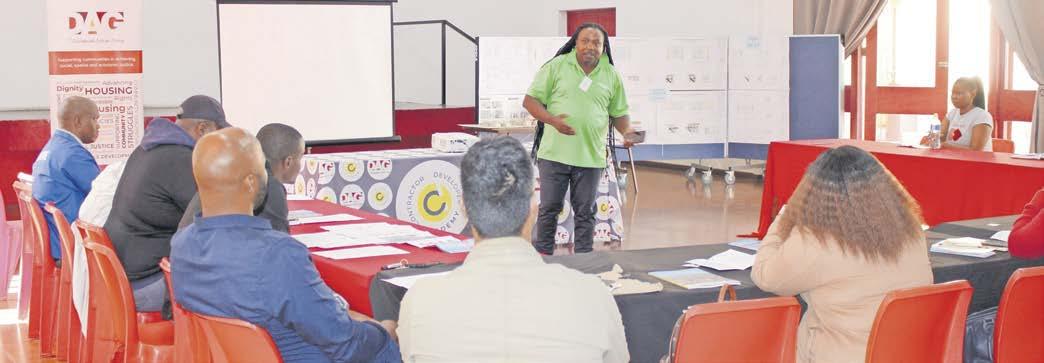
“Mr President, Ministers, banks… come take a seat at our table”
“Dag and others got a working group of us to sit with the city, to get them to see what we were trying to do, to ask them to make a new set of rules that spoke to our sector. We said: ‘The ball is in your court,’ and it seems they have listened (see story P2). But we know so much more needs to be done to make sure this sector starts working and that property becomes an asset that actually provides not only a shelter but a way for us to make money.”
Viruly is clear that “we need to start by reducing the regulatory risk and associated costs of the development process … Red tape is a considerable constraint supply side”.
Changes are happening
The City of Cape Town is certainly moving from its old thinking of rules and regulations, to implementing possible by-law changes that highlight a bottom-up approach and can assist the property sector by cutting cumbersome red tape and bureaucracy and providing concrete assistance.
Yes, says Mgwatyu, things are changing. “What we had happening a few years back is you would have officials throwing rules into our faces to say they can’t talk to us because we were outside the rules. Through hard work, we managed to get champions from inside the municipality through one-on-one engagements and this is bearing fruit.” He describes it as a learning process on both sides.
David Gardner, the team leader of the Programme Management Unit of the City of Cape Town’s Small Scale Rental Unit Mayoral Priority Programme, says it is “a complete change of mindset of municipalities moving from planning and controlling to supporting, guiding and facilitating … it starts with progressive leadership supported by brave and innovative officials who are willing to look at what it has to do to change”.
Local government steps up Deputy mayor and mayoral
committee member for spatial planning and environment,Eddie Andrews adds: “Very importantly, as the world changes around us, we also need to adapt our Municipal Planning By-law to address these … There is a huge demand for affordable rental accommodation in Cape Town and, this time around, we are proposing additions to the by-law to stimulate development in this market in areas where the need is greatest.”
In his recent address, Ramaphosa also spoke of addressing asset poverty.
One of the best ways to create asset wealth is through property –the built environment, says Viruly.
“Many South Africans don’t own any assets – at the moment much of our property can’t be realised or unleashed and is, therefore, dead capital. That’s why getting title deeds, as per the president’s, speech is important so that a house is both a shelter and an economic benefit.
“The single biggest asset for many is their house; they need to unleash those assets, and create asset wealth.”
Why now?
It seems several factors are playing into the reason why smallscale township property developers are getting recognition, not least of all the hard work by individuals and organisations on the ground.
But one also can’t overlook the high cost of living and increasing poverty which is creating entrepreneurs out of necessity, says Nomfundo Molemohi, uMaStandi portfolio manager, Eastern and Western Cape.
uMaStandi is one of the property financing companies for micro-developers to emerge in the landscape. It provides commercial mortgage finance, training, mentorship and guidance to property entrepreneurs wanting to build quality, compliant and sustainable income-producing rental accommodation in townships. They offer loans and have data to show that microdevelopers make it work, showing
just how lucrative the market is.
“This sector has assets the banks can’t recognise which means that they cannot unlock the equity. We need to de-risk the area. This market is exploding. People are enterprising by necessity and they need to find an alternative means of making income.
“Others are gainfully employed and starting to realise they need to invest in long-term assets for future generational wealth. It is not easy, but black families are beginning to have conversations about assets more and more. Even those who no longer live in the township. They realise it is a good business opportunity to create property assets in these areas.”
Banks need new products
Banks, however, have mostly shut their door on microdevelopers, providing only a 20-year mortgage package to a sector who are part of a more informal work market, much like the gig economy.
Mgwatyu says the banks need “to get out of their boardrooms, get their hands on the ground, so that they can better understand what type of packages are suitable for this sector.
“They’ve done this before on other things. Why can’t they have packages that suit this sector … not a 20-year mortgage package only. Some banks are not strangers to the informal space at all.
“We are saying: ‘Come, there is a seat at our table waiting for the banks – we are willing to do what it takes.’”
Lusanda Netshitenzhe, the CEO of TUHF21, a not-for-profit, property financier that has pioneered and scaled financial products and solutions that support building rental entrepreneurs in townships, says: “For decades, townships have been kept on the outskirts of broader economic discussions, often considered too volatile or uncertain for traditional investors. But what I have seen in the work we do tells a different story that is full of potential and opportunity – there is data for the banks to see this.”
Other alternatives
Another finance model by Bitprop is also available to this market.
Bitprop’s Dylan Walls says that when they entered the market it was prolific but informal and “as a new financier we looked at ways to formalise it through providing the finance via our model”. Bitprop gets investment from High Net Worth Individuals, mostly foreign.
“We don’t have many South African HNWI investing.” Bitprop helps build and manage the micro apartments for a percentage of the rent for 10 years but does not take ownership and its model has proven successful.
The co-founder of Empowa, a company that goes beyond our borders and addresses the global housing shortage through its finance model, Glen Jordan, initially began his journey with Cape Town micro-developers.
“What I found was that banks were trying to impose rules and regulations that come from colonial thinking. They have rules and regulations in the financial sector that are geared for the Industrial Age and for the West. They work brilliantly if you get a salary which you can declare and have good credit to show.
“Outside, where these systems don’t work – where credit history
is non-exist or compromised, it is almost impossible to access any financing or to get support to uplift yourself.
“Where systems don’t work alternative systems and programmes will emerge, people make a plan. New systems and functioning systems emerge.
“Without a doubt, we need new ways of doing things … Financial institutions need both data and systems to get funds to this market to make the currently invisible market visible and accessible to formal capital … This is why Empowa has developed technology to build this data which shows just how viable and scalable this market is.
“A backyard rental is probably the best small business you can create – it is almost risk free – and yet no one can access real capital to make it happen.
“You may ask: Why does the micro-developer work? Why are backyard rental payments data significantly higher than national average? For many it is because of the proximity to the landlord … these tenants are not nameless faces.”
The final word goes to Mgwatyu: “There are plenty of seats at our table. Government, banks, locals, come sit, let’s talk and make this asset class work.”











I may be the envy of a few in my industry with this new listing which was totally and tastefully renovated. Handsome and impressive it most certainly will appeal to discerning buyers. It is located in Eastcliff which we know is shining brightly in popularity and well known as the “darling” suburb of Hermanus. The tree-lined streets and proximity to town, the beach and most amenities make it exceptionaly popular. Regarding the design, I think the charrette with the architect took time and immense thought. Sometimes things mean more when less is said and thus, this particular description will be brief. Clientele who are looking for a well located home, excellent finishes, ample living spaces, volumous rooms bathing in light, interior and exterior design balance, gorgeous lines, energy-saving investments and exceptionally thoughtful scales and proportions, this property is for you. In essence, an impeccable home.

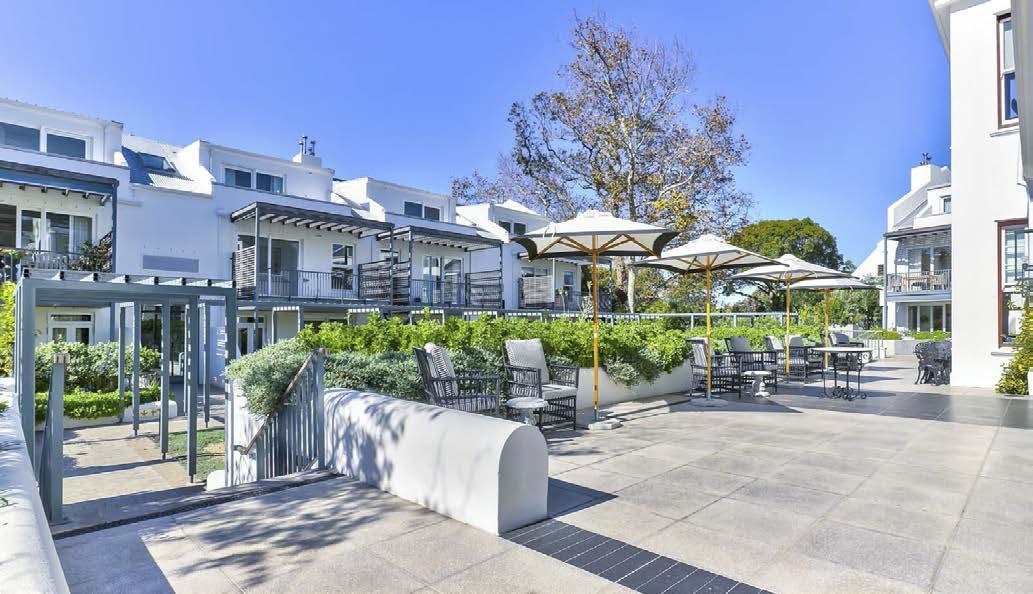
HEN it comes to choosing the ideal retirement home, Wytham Estate sets a new benchmark in Cape Town’s southern suburbs. Designed specifically for those over 60, Wytham Estate offers an unparalleled blend of luxury, comfort and community, ensuring your golden years are spent in style and security.
A unique living experience Wytham Estate stands out with its apartment-style units and charming mews homes, all nestled within beautifully landscaped, award-winning gardens. Each residence is thoughtfully designed to provide both elegance and functionality, creating a perfect setting for relaxed and independent living. From
spacious floor plans to highquality finishes, every detail is crafted to enhance your living experience.
Our apartments and mews homes are not only stylish but also practical. They come with modern amenities and are complemented by energyefficient features, including solar power and battery storage. This ensures that you enjoy comfort while reducing your environmental footprint.
Amenities designed for your comfort
At Wytham Estate, we understand that retirement is about more than just a place to live - it’s about enjoying a lifestyle. That’s why we offer a range of amenities that cater to your needs and interests. Our
on-site restaurant and bar provide the perfect setting for socialising and dining with friends and family, while our community spaces foster a vibrant and engaging atmosphere.
Health and wellness are also a top priority. Our estate offers tailored home-based healthcare services, ensuring that you have access to professional care when needed, while maintaining your independence. Additionally, our premier security system gives you peace of mind, knowing that you and your loved ones are safe.
A community like no other One of the most special aspects of Wytham Estate is its sense of community. We are committed to creating a welcoming environment where you can

build lasting friendships and enjoy an active social life. Regular events, activities, and clubs provide ample opportunities to engage with fellow residents and participate in interests you love.
Living at Wytham Estate means becoming part of a community that values connection, respect, and joy. Whether you’re enjoying a garden stroll, participating in a club activity, or simply relaxing in your beautiful home, you’ll find that Wytham Estate is a place where every day is an opportunity for enjoyment and fulfilment.
Your next chapter begins here Choosing Wytham Estate means embracing a retirement lifestyle that is both luxurious and practical. Located in the picturesque Southern Suburbs of Cape Town, our estate offers convenient access to local amenities, shopping, and healthcare facilities, all while providing a serene and secure environment.
We invite you to visit Wytham Estate and experience firsthand the exceptional living we offer.
Our dedicated team is here to provide you with all the information you need and to help you find the perfect home that suits your needs and preferences.
For more information, visit www.manor.life or reach out to us at sales@curaterealty.co.za or 063 707 2886. Your ideal retirement home is waiting at Wytham Estate - come and make it yours.







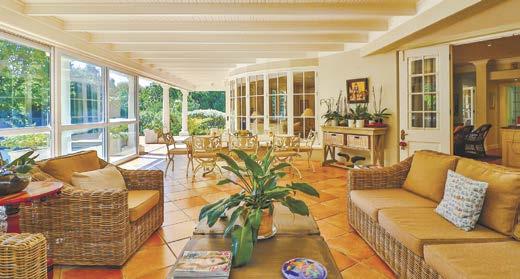
DISCOVER the pinnacle of retirement living at Wytham Estate, where luxury and comfort come together in Cape Town’s picturesque southern suburbs.
Tailored for those over 60, Wytham Estate offers elegance and practicality, ensuring a lifestyle that is enjoyable and secure.
Our estate features stylish apartment-style units and charming mews homes, all set amid beautifully landscaped gardens.
Each residence is designed with attention to detail, providing spacious living areas and modern amenities that cater to
your every need. Energy-efficient features, such as solar power and battery storage, add to your comfort while reducing environmental impact.
Wytham Estate is more than a place to live; it’s a vibrant community where you can thrive.
Our on-site restaurant and bar are perfect for social gatherings, while tailored home-based health-care services ensure that you remain independent, with access to care when needed. Premier security gives you peace of mind, knowing you are safe.
Engage in a rich social life
with our range of activities and community events. Build lasting friendships, explore your interests and enjoy a fulfilling lifestyle in a welcoming environment.
Wytham Estate offers tranquillity and convenience, with easy access to amenities and services.
Visit us today to discover how our community can enhance your retirement years. For more information, visit www.manor.life or contact us on 063 707 2886 or sales@curaterealty.co.za or.
Your perfect retirement home is ready – come and make it yours.
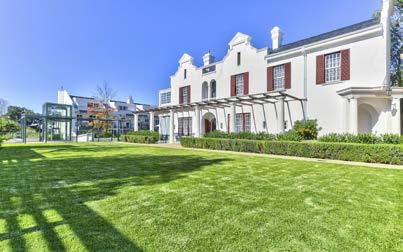
ARTIFICIAL intelligence (AI) is revolutionising various industries, and the real estate sector is no exception, with the integration of AI transforming how homes are bought and sold.
Alexa Horne, the DG Properties managing director, offers insights into the ways AI is impacting the real estate industry and what this means for property buyers and sellers:
1. Enhanced property search and recommendations
“AI-powered platforms are transforming the way people search for property by offering more personalised and accurate recommendations. The systems analyse vast amounts of data, including user preferences, search history and online behaviour, to
suggest properties that best match a potential buyer’s criteria,”
2. Automated Valuation Models
“AI-driven Automated Valuation Models (AVMs) use machine learning algorithms to assess property values.
The models consider factors such as location, market trends, property condition and historical sales data to provide accurate and up-to-date property valuations. AVMs help buyers, sellers and real estate agents make informed decisions quickly and confidently.”
3. Predictive analytics for market trends
AI is adept at analysing vast datasets to identify patterns and predict future market trends.
“As real estate professionals, we can use predictive analytics to
forecast property prices, rental rates and investment opportunities. This capability allows us to guide investor buyers to make data-driven decisions, potentially increasing their return on investment and minimising risks,” says Horne.
4. Virtual tours and augmented reality
AI-powered virtual tours and augmented reality (AR) are changing the way properties are marketed and viewed.
“Prospective buyers can take immersive virtual tours of properties from anywhere in the world, saving time and resources. AR technology allows users to visualise how a space would look with different furniture and decor, making it easier to make buying decisions.”
5. Fraud detection and security
“AI systems are also enhancing security and fraud detection in real estate transactions. Machine learning algorithms can analyse transaction data to identify unusual patterns and potential fraud, ensuring safer transactions. This capability is particularly valuable in preventing wire fraud and identity theft in real estate dealings.”
6. Optimised marketing strategies
“AI can help real estate companies optimise their marketing strategies by analysing consumer data and behaviour. This analysis allows for targeted advertising campaigns that reach the right audience with personalised messages, increasing the effectiveness of marketing efforts and reducing costs. The integration of AI



in the real estate industry is bringing about significant improvements in efficiency, accuracy and customer satisfaction.
“However, while AI brings advancements to the real estate industry, it cannot replace the human touch. The personal connection, emotional intelligence, negotiation skills, local expertise and problemsolving abilities of real estate agents remain crucial for successful property transactions. AI should be seen as a tool that complements rather than replaces the invaluable human element in real estate.”
For more information or guidance on property sales in Cape Town visit www.dgproperties.co.za or contact DG Properties at 021 433 2580.

